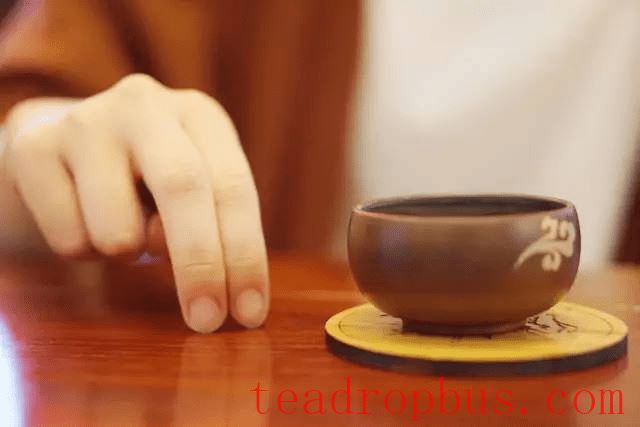In Guangdong, particularly in Guangzhou, have you ever heard a crisp tapping sound while enjoying a fragrant cup of Tea poured for you by someone else? This isn't someone urging you to drink your tea; rather, it is a traditional way of expressing gratitude known as the finger-knocking Etiquette.

The Origin of Finger-Knocking Etiquette:
A beautiful legend circulates regarding the origin of this tradition. It is said that when Emperor Qianlong traveled incognito to the south, he stopped at a teahouse. The teahouse owner enthusiastically served him tea, which Qianlong praised highly. To express his thanks, Qianlong wanted to kneel and bow his head to the owner but reconsidered due to his royal status. Instead, he gently tapped the table with his fingers as a sign of gratitude.
This gesture was noticed by Heshen, who promptly mimicked the emperor's action. Qianlong smiled and said, “This is the finger-knocking etiquette. From now on, whenever someone pours tea for you in a teahouse, use this gesture to show your appreciation.” Since then, this etiquette has spread throughout Guangdong and become an indispensable part of tea-drinking customs.
The Significance of Finger-Knocking Etiquette:
Although simple, finger-knocking etiquette carries profound meaning. It expresses respect for the art of tea-making, appreciation for the aroma and flavor of the tea, and gratitude towards the person pouring the tea.
In Guangdong, Tea culture has a long history, and people hold deep affection for tea. The finger-knocking etiquette embodies this tea culture, reflecting the reverent and grateful spirit of the locals towards tea.
The Details of Finger-Knocking Etiquette: Age and Rank Matter:
While straightforward, there are nuances to finger-knocking etiquette. Different situations and statuses dictate different manners of performing this gesture.
- When an elder pours tea for a younger person, the younger one should tap the table three times. This signifies respect and gratitude towards the elder.
- Among peers, tapping the table once is sufficient. This shows respect and gratitude towards friends.
- When a younger person pours tea for an elder, the elder may choose not to return the gesture. This conveys the elder's care and support for the younger generation.
When performing the finger-knocking gesture, keep the following points in mind:
- Keep your fingers together and lightly tap the tabletop.
- The number of taps depends on the relationship and context.
- Tap with a smile to convey gratitude.
The Continuation of Finger-Knocking Etiquette: Preserving Traditional Culture:
Finger-knocking etiquette is not just a table manner; it is also a cultural tradition. It embodies the Chinese values of respecting the elderly and caring for the young, as well as humility and courtesy.
In modern times, despite the fast-paced lifestyle and changes in tea consumption habits, this traditional etiquette remains. It serves as a reminder to preserve cultural heritage even as we enjoy material comforts.
Though merely a simple gesture, finger-knocking etiquette carries profound cultural significance. Understanding and practicing this custom enriches our cultural knowledge and adds a touch of politeness and warmth to daily life.